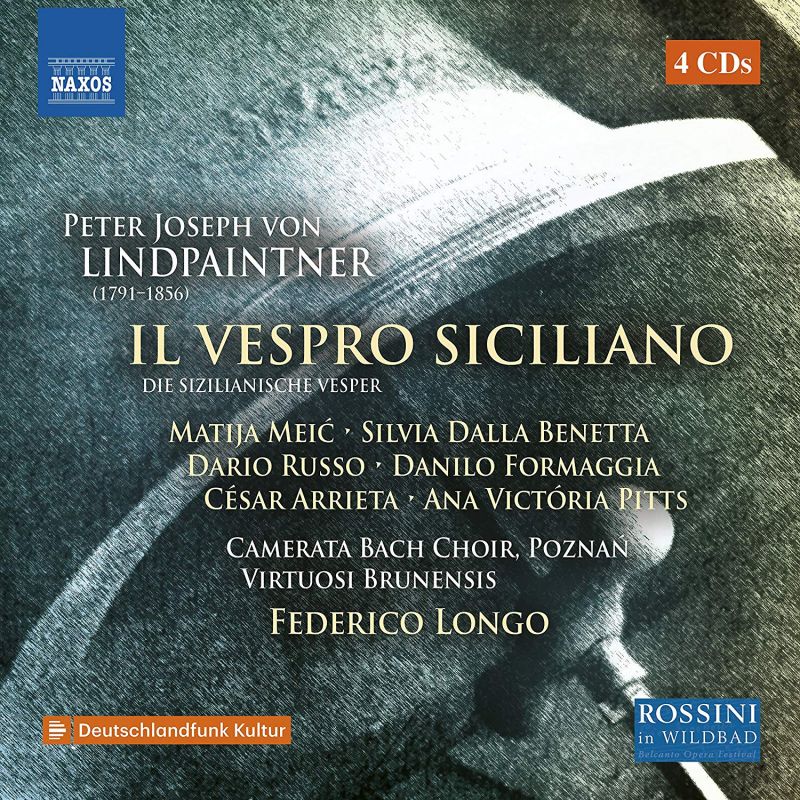LINDPAINTNER Il vespro siciliano
View record and artist detailsRecord and Artist Details
Composer or Director: Peter Joseph von Lindpaintner
Genre:
Vocal
Label: Naxos
Magazine Review Date: AW18
Media Format: CD or Download
Media Runtime: 201
Mastering:
DDD
Catalogue Number: 8 660440-43

Tracks:
| Composition | Artist Credit |
|---|---|
| Il vespro siciliano |
Peter Joseph von Lindpaintner, Composer
Ana Victória Pitts, Albino, Mezzo soprano Camerata Bach Choir, Poznan Carlos Natale, Guillaume l'Etendart; Visconte Vernazzo, Tenor César Arrieta, Alphonse Drouet, Tenor Damian Whiteley, Il Conte de Marche; Francesco Ruffo; Carceriere, Bass-baritone Danilo Formaggia, Il Conte di Fondi, Tenor Dario Russo, Giovanni da Procida, Bass Federico Longo, Conductor Matija Meić, Carlo d'Anjou, Baritone Peter Joseph von Lindpaintner, Composer Sara Blanch, Aurelia, Soprano Silvia Dalla Benetta, Eleonora, Soprano Virtuosi Brunensis |
Author: Tim Ashley
The subject is the 1282 Sicilian uprising against French rule, familiar from Verdi’s Les vêpres siciliennes, with which Lindpaintner’s opera also shares the character of the revolutionary leader Procida, similarly cast as a bass. The plot, however, primarily concerns Count Fondi, who has secretly married Eleonora, the intended bride of king Charles (Carlo) of Anjou, to the fury both of the latter and of Alphonse Drouet, a French nobleman obsessed with Fondi’s destruction. There are Shakespearean overtones in the characterisation of Carlo, who has murdered his way Macbeth-like to power, while Iago lurks behind both Drouet’s malign scheming and his surface charm. A subplot, meanwhile, dealing with the affair between Fondi’s page Albino and Eleonora’s maid Aurelia weaves its way in and out of the main narrative.
Though no masterpiece, the opera is by no means negligible. The score operates on two stylistic levels, with bravura showpieces for the aristocratic protagonists and strophic ballads for their servants, though Aurelia, who has designs on Drouet above her station, tellingly inhabits both worlds. Fondi and Drouet, both tenors, square off like a pair of divos from one of Rossini’s opere serie, which Lindpaintner much admired. A quartet of Sicilian noblemen, pre empting the Knights in Lohengrin, sing in attractive close harmony throughout, and feature in the striking first-act concertato for male voices only. There’s a tremendous double chorus at the start of Act 2, meanwhile, during which Procida is seen stirring up trouble by setting faction against faction.
The recording impresses, too, though it takes a while to get into its stride. Conductor Federico Longo dawdles a bit in the first act but quickens both pace and momentum later on when the plots and counterplots begin and Fondi’s life starts to unravel. The best performances come from Matija Meic´’s guilt-ridden Carlo and César Arrieta’s insidiously elegant Drouet. Danilo Formaggia occasionally finds Fondi’s coloratura tricky, but Silvia Dalla Benetta makes a stylish Eleonora and Dario Russo is very commanding as Procida. Choral singing and playing are consistently strong, though the work needs a slightly larger body of strings than we have here. The live recording, admirably clear, captures a fair bit too much extraneous rustling as the players turn their music, which is one drawback. The other is the libretto, which you have to download from the Naxos site and comes in Italian only: we really could do with a translation.
Discover the world's largest classical music catalogue with Presto Music.

Gramophone Digital Club
- Digital Edition
- Digital Archive
- Reviews Database
- Full website access
From £8.75 / month
Subscribe
Gramophone Full Club
- Print Edition
- Digital Edition
- Digital Archive
- Reviews Database
- Full website access
From £11.00 / month
Subscribe
If you are a library, university or other organisation that would be interested in an institutional subscription to Gramophone please click here for further information.




